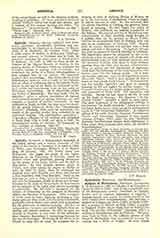

Agrippa of Nettesheim, HEINRICH CORNELIUS, b. September 14, 1486, at Cologne; d. at Grenoble or Lyons in 1534 or 1535. One of the remarkable men of the Renaissance period. Described as “knight, doctor, and by common reputation, a magician”, Agrippa earned and repaid the bitter enmity of his more conservative contemporaries. We find him a student at Cologne and Paris (1506), in Spain (1507-08), a teacher of Hebrew at Dole (1509), a teacher in England (1510), about which time he finished his work “De occulta philosophia,” (Antwerp, 1531), a mixture of Neoplatonism and the Cabbala. He spent some time in Italy in the military service of the Emperor Maximilian, who rewarded his bravery by making him a Ritter or knight. He soon turned however to other pursuits, studied medicine, Hebrew. Alchemy, theology, and finally devoted himself to “Cabalism” under the influence of Reuchlin (q.v.) and Raymond Lully (q.v.). He lived and taught in various places, making friends or enemies wherever he went, but was apparently not very successful financially, as he was banished from Cologne for debt, and spent his last days in poverty, a typical example of the irregular, vicissitudinous life led by his kind at that time. His numerous works, chiefly philosophical, have a strong bias towards “occultism”, and run counter to the received opinions of his time in theology and scholastic philosophy. He lived and died nominally a Catholic, but was openly in sympathy with Luther, whose tone towards the Church and her institutions he adopted, while professing that he was merely attacking abuses, not the Church, an attitude frequently assumed at that period.
His famous work “De incertitudine et vanitate scientiarum”, published in 1527, has been translated into many European vernaculars and is well described as “a compound of erudition and ignorance, gravity and vanity”. It abounds in denunciations of scholasticism, veneration of relics and saints, the canon law and the hierarchy, and calls for a return to the Scriptures as the philosopher’s stone (Lydius lapis) of Christian teaching. For the rest he is no follower of Luther or his companions. They interest him as the first who stood out with success against Catholic orthodoxy. Giordano Bruno (q.v.) made use of his writings, and their influence was long powerful. Among his minor writings are the often quoted booklet “De nobilitate et praecellentia feminei sexus declamatio”, dedicated to Margaret of Austria, “Libellus de sacramento matrimonii”, a commentary on the “Ars Brevis”, of Raymund Lully, etc. A complete edition of his works appeared at Lyons in 1600.
FRANCIS W. GREY

